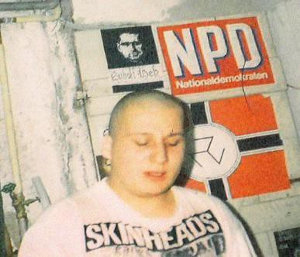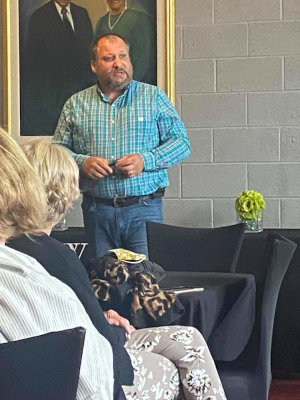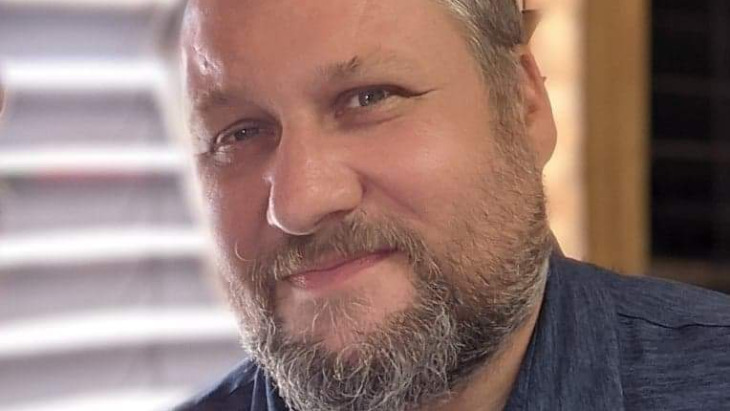After the synagogue attack in Texas, former Nazi TM Garret says we can rise above fear.
TM Garret realizes he could have been in that synagogue in Colleyville, Texas – not in his former life as a white supremacist and Ku Klux Klan leader, but as someone in the process of becoming a Jew by choice.
After a terrorist took the rabbi and three Congregation Beth Israel members hostage during Shabbat morning services, Garret flashed back to the first time he had gone to synagogue to pray. It was Yom Kippur two years ago. He had attended many times as a public speaker, but in 2019 Garret, a researcher and analyst for the International Center for the Study of Violent Extremism, threw his hat in the ring and began to identify with the Jewish people.
“I already had joined Jewish friends for Shabbat dinners, Passover and Hanukkah. I had lectured many times at synagogues and Chabad houses. But I had never been to a synagogue just for the purpose of being in services and praying,” he reflects.
During his former days of hate

“So I decided to make Yom Kippur my first time. I became acquainted with the rabbi of Or Chadash Synagogue in Memphis, Tennessee, and was warmly welcomed. Yom Kippur was a perfect day for me – I had to ask for a lot of forgiveness that night. For the first time in life I wore a yarmulke and they handed me a transliteration so I could pray in Hebrew.”
After services a congregant sought him out to inquire about antisemitism in Germany, where Garret was born. Garret assured him that Jews wouldn’t have to worry about the Germans again, knowing how much his homeland had atoned for its egregious Holocaust history.
He spoke too soon. The next day – the holiest on the Jewish calendar – a neo-Nazi attacked a synagogue in Halle, Germany. Garret felt betrayed: “What did I tell these people last night?” Then it dawned on him: “If someone had entered that synagogue where I was last night with the intention of murdering everybody inside, I would have been dead. I looked like a Jew, I prayed like a Jew.”
After many years of exploration, the 46-year-old human rights activist finally feels he has found his spiritual home in Judaism.
Garret was born into a German Catholic family that only attended church on Christmas. While he grew up believing in God, religion didn’t play a major part in his life for a long time.
I explored all these groups I once hated and found out how many stereotypes that many people believe in are just wrong.
He felt like an outcast in the small German town of his youth. Both parents had a drinking problem and they divorced shortly after his birth. His mother was rearing four children by herself, which was unusual in those days.
Uncomfortable in his own skin, Garret embraced bigotry to blend in. As a teenager he fell in with hate groups, became a white supremacist and then climbed the ladder to become a leader in the Ku Klux Klan in Europe.
Love and Compassion Melted Away Hate
Fifteen years ago, after vilifying anyone who was different, from Jews and Muslims to immigrants and gays, a door opened to escape the hell of hate. It came in the form of a Turkish Muslim man who showed Garret love, compassion and commonalities that are bridges.

“After a long journey I was allowed to explore all these groups I once hated,” says Garret. “I found out how many stereotypes that many people believe in are just wrong.
“In 2018 I started to explore Judaism. The ethics of Judaism aligned with my newly formed ethics, I felt attracted to this diverse community and since I never stopped believing in God, I also found a new religious home. At first, I wasn’t sure what I was attracted towards most – the community, the ethics or the religion. I found that Judaism is all of it! I developed a deep love for it, and in 2020 it became clear to me. I made the decision to join these wonderful people and to convert.”
Self-Reflection: Will I Be a Good Jew?
Garret asked himself many questions before coming to that conclusion. Is this the right thing? Does it make sense? Would I be a good Jew? His rabbi reassured him, “It’s a journey. Do the best you can.”
Garret has a sense of what it feels like to belong to a minority group. The Simon Wiesenthal Center once gave him a jacket emblazoned with a Star of David after speaking engagements at the Alpha Epsilon Pi 106th International Convention and National Museum of American Jewish Military History in Washington, D.C. Wearing it on the street, Garret had a startling thought. “I wouldn’t be surprised if I get hit in the back by a bottle.” He didn’t take off the jacket.
You can’t fight hate with hate. We break down their barriers with compassion and unconditional love.
After the synagogue standoff in Colleyville, where all four hostages were saved, Garret said it’s important not to cave into fear. “I think this is why the Jewish people are still here. They never gave into fear or abandoned their beliefs.”
The Power of Compassion and Connection
Garret counsels people to recognize they have the power to help others get out of the forest of hate before becoming violent actors who inflict hurt. Try to talk rather than vilify them. Show understanding for their fears, with empathy but not sympathy, while clearly saying you don’t share their opinions.
Find compassion for those you might disagree with. Seek to understand them as people rather than dismissing them with a label. Look for ways to have a conversation. Listen rather than enter these conversations with the goal to change them or to tell them that you are right and they are wrong.
They’ll often let you become a trusted source for them before they trust the radicals, says Garret. “We break down their barriers with compassion and unconditional love. This is how I got deradicalized. You can’t fight hate with hate.”
[Published on Aish.com, January 17, 2022]

